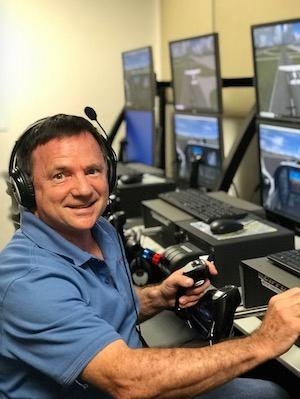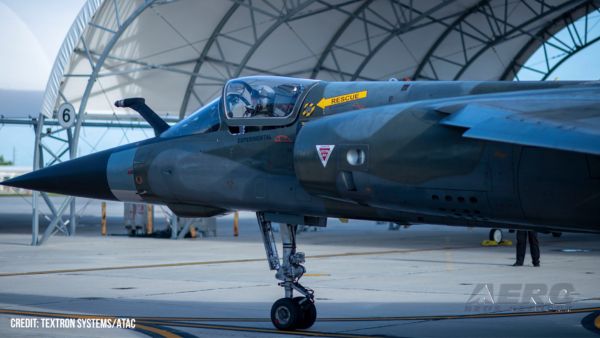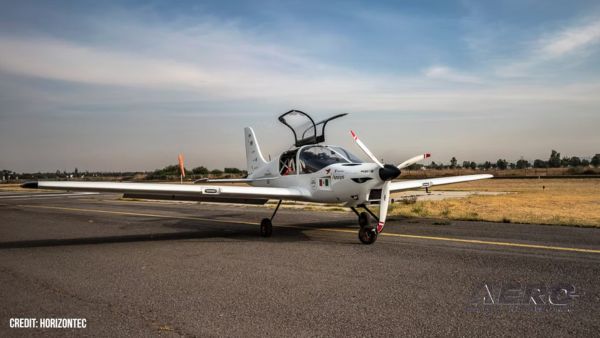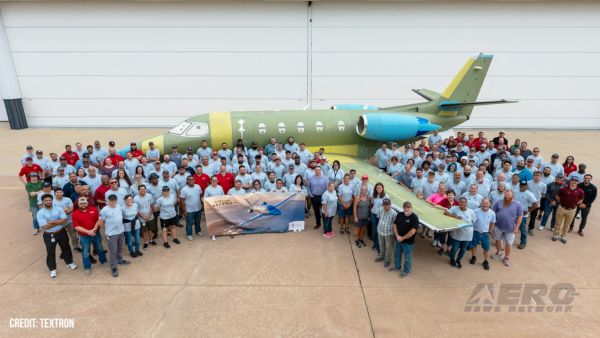ERAU Prescott Uses A Faculty Developed Simulation Program To Improve Student Pilot Training
By Maxine Scheer
If you are an incoming flight student attending the Prescott campus of Embry-Riddle Aeronautical University, True Course Simulations (TCS) is now required as part of the private pilot coursework. TCS is intended to provide students with a convenient, less expensive and more effective set of tools for preparing, practicing and reinforcing flight training in order to get the maximum value from the costliest components, time with Instructor Pilots (IPs) and in-flight training.

ANN met TCS founder, Professor Raynald (Ray) Bedard (pictured), at the ERAU AirVenture 2018 Alumni Dinner. Bedard is a retired Navigator with the Canadian Air Force (CAF) and 15-year tenured faculty member at the ERAU Prescott campus. This was Ray's first time attending AirVenture. Bedard described TCS as a game-changer in flight training.
Professor Bedard leads classroom and laboratory training in Navigation, Flight Management Systems and other coursework within the College of Aviation and cares deeply about student learning and success. "I observed students over the years and asked a lot of questions. Flight students were leaving for basically two reasons, either they ran out of money and/or it was not fun." Bedard asked students about what they wanted to help improve learning, and the response was they wanted to prepare for flight activities on their own time and in their own environment.
Bedard came to Prescott with years of experience developing simulations for training during his 20+ years of service with the CAF, where he logged over 3,000 hours in the CP-140 Aurora.
Over the last ten-plus years, Bedard invested significant time developing simulation tools for his students in Prescott and found they learned significantly more. "Pilots tend to be highly visual and kinesthetic learners, but we teach in the classroom with lectures and PowerPoint, the least effective method."
The idea for the TCS program started with observing flight students participating in Virtual Air Traffic simulation (VATSIM) activity as a round robin. "We saw the students use of the tool and deduced that learning would improve if the activity included more controls." He and student interns went on to build and test the Embry-Riddle Virtual Airspace (ERVA) simulations for Air Traffic Control (ATC) along with flight training simulations with Microsoft Flight Simulator.
"Over the years, we added briefings to help prepare students for the simulation, but that wasn't good enough, so I personally invested my own capital and thousands of hours in software development to come up with TCS." During AirVenture, Professor Bedard set up his computer and a joystick to provide a demonstration and an overview of the 60+ lessons to be used by students. The interactive lessons are based on the private pilot course, "This is where we lose the most students."
The three main components of TCS are 1) Read It, where each lesson has two or three pages that describe the learning objectives, 2) Watch It, where students see a video demonstration of what successful performance of the activity or maneuver looks like, and 3) Do It, the simulation component where students fly the lesson.
Bedard described the lab where students use the software. "We set up six stations at the Prescott academic campus, versus out at the airport, to make it more accessible. Students sit in front of the booth with Precision Flight Control (PFC) Cirrus yokes, throttle quadrants, rudder pedals and two monitors. We start with one-on-one instruction. Students wear a headset and hear instructions, including when they deviate. Students very quickly learn how to self-correct and prefer to continue, on their own, repeating maneuvers at multiple points within the lesson. We are also testing a Virtual Reality (VR) component that appears to be very effective in helping students with maneuvers such as S-turns and traffic patterns. New modules are also in development for Instrument flight training."
When asked about how TCS differs from other simulators out in the market, Bedard described the importance of having content. "If you donít have someone to get you started, simulators can quickly become dust gathering devices. With instruction and scenarios, the machines become more effective."
Professor Timothy Holt, Dean of the College of Aviation at ERAU, confirmed TCS would be required for students taking AS121, ERAU's five-credit course approved for FAA private pilot ground school. "What Iím really looking for is student retention of the material." Dr. Holt recalled the application of the law of Primacy in flight training - what you learn first, you learn best. "TCS is great for introductions, and if there is a weakness, students can practice in a low-cost environment to nail it before going back into the aircraft. Instructors can also see how students are performing on TCS and gauge lessons around it." Having observed students use TCS over the last few years, Holt noted some strengths. "Utilizing TCS, students spend more time preparing for their flights and looking through checklists. There are new VR modules being developed for flight training, but thus far, the prep and preflight has been the best part."

Brett Watts (pictured), PhD Student at ERAU Prescott, drove out with Bedard to attend AirVenture. Watts provided some insights on his PhD dissertation that involves TCS, "Virtual Flight Instructor: A 21st Century Approach to Meeting Pilot Demand." Brett will be conducting both quantitative and qualitative analyses on cost/resource savings for the students and the flight training sponsor, student outcomes, and potential other areas of efficiency from using TCS as a training resource.
Bedard is also launching in 2018 a PC version of True Course Simulations for the at-home user and provides on the TCS website some lessons learned on the "Whys", to help students and parents make the decision to invest in flight training.
From a cost perspective, Bedard sees student use of TCS quickly paying for itself by replacing less than two hours of dual flight training. Fun is more likely to happen when students walk onto the flight line feeling more confident and prepared.
(Images provided by the author)
 Classic Aero-TV: Expert Analysis By The Kings-Airman Cert Standards 2016
Classic Aero-TV: Expert Analysis By The Kings-Airman Cert Standards 2016 Aero-News: Quote of the Day (09.17.25)
Aero-News: Quote of the Day (09.17.25) ANN's Daily Aero-Term (09.17.25): Discrete Code
ANN's Daily Aero-Term (09.17.25): Discrete Code ANN's Daily Aero-Linx (09.17.25)
ANN's Daily Aero-Linx (09.17.25) NTSB Final Report: Piper PA-46-310P
NTSB Final Report: Piper PA-46-310P




